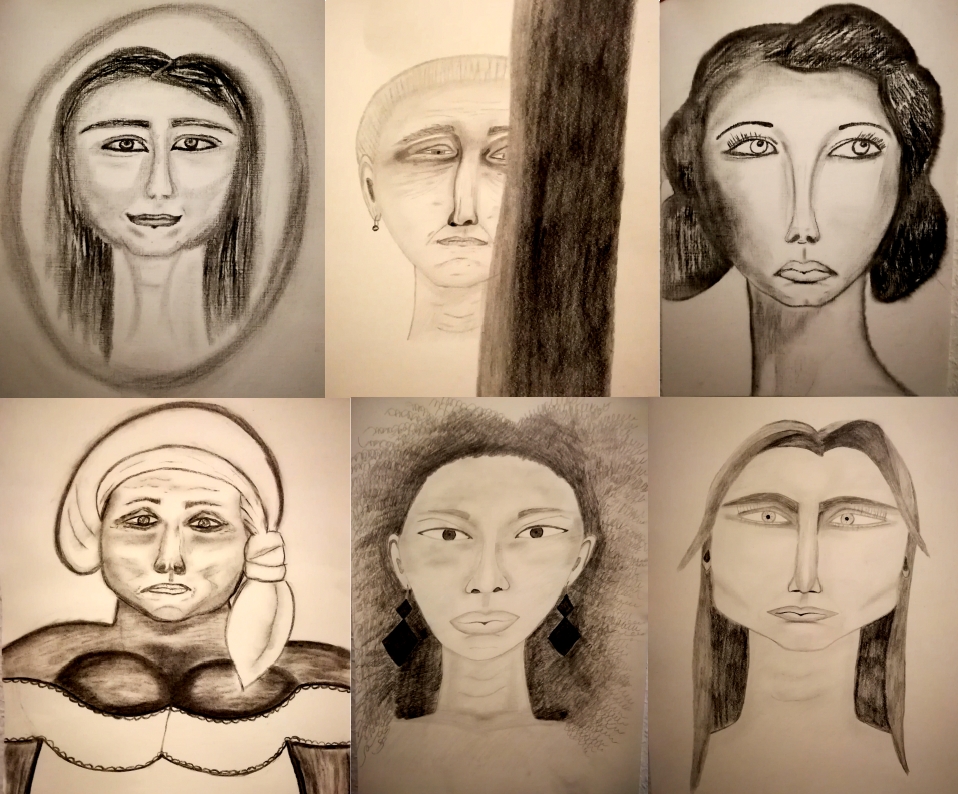Às mulheres brasileiras
por Paola Goldenbaum
(*TEXT IN ENGLISH IS BELOW)
No Brasil entramos em 2019 encarando o fascismo. Com isto, diferentes grupos identitários foram afetados negativamente país afora. Antes mesmo da posse, surgiram casos de crimes perpetrados contra minorias e a insignificância com que tais casos foram recebidos já se mostrou assombrosa.
“Eu levanto a minha voz – não para gritar – mas para que aqueles sem voz possam ser ouvidos… Nós não podemos ter êxito se metade de nós está sendo reprimido.” – Malala Yousafzai
Foi-me dolorido assistir ao espetáculo das eleições de 2018, a parca esperança de que o pior não aconteceria foi apagada muito rapidamente, Pandora cerrou-a em sua caixa logo ao final do primeiro turno. Torci, fiz campanha contra Bolsonaro, mantive a cabeça erguida até o fim, contudo já imaginava o resultado, limitando-me a um suspiro quando, por fim, deparei-me com ele na noite do dia 28 de outubro. As razões para minha dor não são poucas, dado que tenho compaixão e realmente me firo com as tristezas dos muitos que são e serão atacados por este novo governo. Existe, no entanto, uma razão que me é especial: sou mulher. Logo que as ditas eleições tomaram sua grotesca forma e os ânimos esquentaram, uni-me às mais de duas milhões de mulheres que se juntaram no grupo ‘Mulheres unidas contra Bolsonaro’ na luta contra o inimigo. Nosso grupo é plural, representamos as mais diversas realidades brasileiras, mas há uma cola que nos une. Como mulheres enfrentamos batalhas diárias, seja o medo de assédio no ônibus para o trabalho, seja a mãe solo que convive com o abandono paternal, sejam os salários inferiores, seja o abuso físico ou psicológico, ou uma infância marcada por violência sexual ou doméstica. Poucas são as mulheres brasileiras que podem dizer não ter passado por nenhuma destas batalhas listadas acima.
Em 2017 foram registrados no Brasil 946 casos de feminicídio, ou seja, mulheres que foram
assassinadas em crimes de ódio; as famílias compostas por mãe solo no Brasil somam hoje mais de dez milhões; mulheres ganham apenas 77,5% do salário dos homens; até agosto de 2018 foram computados 60 mil casos de estupro durante o ano no país. Os números mostram uma terra onde a mulher ainda vive em grande desigualdade e sofre com enorme insegurança. Como, pois, pudemos eleger alguém ao cargo mais alto do executivo de nosso país que demonstra tamanho desrespeito para com ao menos metade da população? Não há motivos para reproduzir aqui as falas odiosas, descabidas e patriarcais do presidente eleito, pois elas já foram vastamente disseminadas pelos meios de comunicação e podem ser facilmente acessadas por quem estiver disposto a ver a verdade sobre seus pensamentos em relação a nós.
Durante muitos anos eu me afastei do feminismo, julgando ser um movimento distante das minhas ideologias e realidade. Pobre de mim, não imaginava o quanto da minha vida devo ao feminismo, pois, em países onde o movimento ainda (quase) inexiste, mulheres como Malala são forçadas a arriscar a própria vida pelo direito aos estudos, direito este tão básico a nós mulheres ocidentais. Como dizer então que estamos em pé de igualdade com os homens, quando estes já votavam na Grécia Antiga, enquanto nós apenas no século XX? Nossa voz é ouvida há menos de um século no Brasil e ainda é notavelmente fraca, nosso congresso e senado são formados majoritariamente por homens, embora somemos pouco mais da metade da população. Frequentemente nossa fala é calada ou interrompida por mansplaining*.
Feminismo não é uma luta por poder e não busca privilégios. Pedimos paridade em uma sociedade que nos privou de direitos humanitários básicos durante séculos e continua nos mantendo um degrau abaixo em relação aos homens. Queremos representatividade na política; queremos salários iguais; queremos atendimento digno e humanitário quando sofremos agressão; queremos proteção contra parceiros opressores; queremos o direito ao aborto sim!, pois é nosso corpo.
Mulheres brasileiras: sofremos um forte abalo em 2018, entretanto eles não nos calarão. Seguiremos juntas, de mãos dadas, e exigiremos nosso lugar de igualdade neste Brasil que também é nosso. Não permitiremos leis que ferem os mais básicos direitos humanos sendo impostas sobre nós. Andamos já uma longa jornada em nossas conquistas e, dessa forma, continuaremos. Derrubaremos cada tentativa de nos oprimir e lutaremos por cada melhoria no sistema. Unidas somos mais fortes do que o mal que tenta nos derrubar.
*(do inglês man+explaining (homem+explicando)). Prática na qual um homem “explica” didaticamente um conceito para uma mulher como se ela fosse intelectualmente incapaz, sendo ela já o conhece ou, até mesmo, é especializada no assunto.
 Paola Goldenbaum é estudante de Pedagogia e ativista social, especialmente nas áreas de Direitos da Mulheres e Acesso à Educação. É membra dos grupos ‘Mulheres unidas contra Bolsonaro’ e ‘Resistência Democrática Judaica’.
Paola Goldenbaum é estudante de Pedagogia e ativista social, especialmente nas áreas de Direitos da Mulheres e Acesso à Educação. É membra dos grupos ‘Mulheres unidas contra Bolsonaro’ e ‘Resistência Democrática Judaica’.
Imagem acima: ‘Faces delas’, da autora do texto
***
To Brazilian women
by Paola Goldenbaum
In Brazil we entered 2019 facing fascism. Therewith, different identity groups were negatively affected across the country. Even before the elected president has taken office, crimes against minorities arouse and the insignificance with which such crimes were received was already astounding.
“I raise up my voice – not so I can shout – but so that those without a voice can be heard. We cannot succeed when half of us are held back.” – Malala Yousafzai
It was painful for me to watch the 2018 election spectacle, the little hope that the worst would not happen was blown out very quickly, Pandora locked it in her box at the end of the first round. I cheered, I campaigned against Bolsonaro, I held my head up to the end, but I had already imagined the result, and only sighed when I finally saw it on the night of October 28th. The reasons for my pain are not few, since I am a compassionate person and I really feel sad with the sorrows of the many who are and will be targeted by this new government. There is, however, a special reason for me: I am a woman. As soon as the elections took their grotesque form and the moods warmed up, I joined the more than two million women who joined the group “Women united against Bolsonaro” to fight the enemy. Our group is plural, we represent the most diverse Brazilian realities, but there is a glue that unites us. As women we face daily battles, perhaps the fear of harassment in the bus to work, or the mother who raises her child alone, or lower wages, or physical or psychological abuse, or a childhood marked by sexual or domestic violence. Few Brazilian women can claim not to have been through the distresses listed above.
In 2017, 946 cases of feminicide were registered in Brazil, that is, women who were murdered in hate crimes; the families without a father in Brazil now sum up more than ten millions; women earn only 77.5% of a man’s salary; by August 2018, 60,000 cases of rape were recorded during the year in the country. The numbers expose a land where women still live in great inequality and struggle with insecurity. How, then, could we elect someone to the highest office of our country who shows such disrespect to at least half the population? There is no reason to reproduce here the loathful, misguided and patriarchal quotations of the elected president, for they have already been widely disseminated by the media and can easily be accessed by anyone who is willing to see his truthful thoughts about us.
For many years I have kept myself away from Feminism, believing it was a movement far from my ideologies and reality. Poor me, I could not imagine how much of my life I owe to Feminism, since, in countries where the movement still (almost) does not exist, women like Malala are forced to risk their lives for the right to study, a right that is so basic for us western women. How can we say that we are on an equal level with men, when they were already voting in Ancient Greece, while we were only allowed to in the 20th century? Our voice has been heard for less than a century in Brazil and is still remarkably weak; our congress and senate are formed mostly by men, although we sum up more than half of the population. Frequently our speech is silenced or interrupted by mansplaining*.
Feminism is not a fight for power and does not seek privileges. We ask for parity in a society that has deprived us of basic humanitarian rights for centuries and continues to keep us one step behind men. We want equal representativeness in politics, we want equal wages, we want dignified and humane service when we suffer aggression, we want protection against oppressive partners, we want the right to abortion, because it is our body.
Brazilian women: We suffered a great loss in 2018, but they will not shut us up. We will continue together, hand in hand, and demand our place of equality in this Brazil which is also ours. We will not allow laws that hurt the most basic human rights being imposed on us. We have already had a long journey in our conquests and we will continue in this path. We will stop any attempt to oppression and will strive for each improvement in the system. United we are stronger than the evil that tries to overthrow us.
*(man+explaining) A practice in which a man “explains” a concept to a woman as if she were intellectually incapable, even when she already knows it or is specialized in the subject.
 Paola Goldenbaum is a student of Pedagogy and a social activist, especially in the areas of Women’s Rights and Access to Education. She is a member of the groups ‘Women united against Bolsonaro’ and ‘Democratic Jewish Resistance’.
Paola Goldenbaum is a student of Pedagogy and a social activist, especially in the areas of Women’s Rights and Access to Education. She is a member of the groups ‘Women united against Bolsonaro’ and ‘Democratic Jewish Resistance’.
Image above: ‘Their faces’, by the author of the text
***


Sensacional, linda mensagem para reflexão e ação